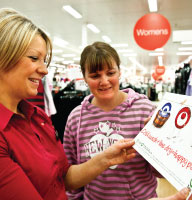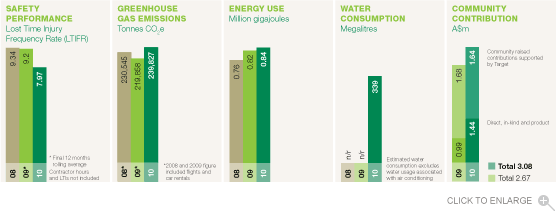About our business
One of Australia’s leading department store retailers, Target aims to provide great style, great value clothing, homewares and general merchandise to satisfy the needs of Australian families. Target is positioned between the high-end department stores and the discount department stores and offers a unique combination of product, value and convenience.
The core product ranges at Target include womenswear, intimate apparel, menswear, childrenswear, accessories, soft homewares, electrical, toys and other general merchandise. Our key point of difference is the use of Target branded product, with national brands and licences used to complement the Target range.
In June 2010, more than 24,000 team members were employed in 171 Target stores and 119 Target Country stores throughout metropolitan and regional Australia.
Our full year sales in 2009/10 were $3.8 billion and we opened three Target stores and four Target Country stores.
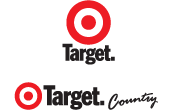
Year in review
Over the last year we continued our commitment to improve the safety performance of our team members, explored and measured energy saving opportunities and supported our community partners.
Team member safety remains a key focus area for Target. Equipment modification in conjunction with continued manual handling awareness has led to a reduction in workplace incidents, reducing our LTIFR by 13 per cent from 9.2 to 7.97.
In February 2010 we introduced a new Paid Parental Leave scheme to provide additional support to team members with family responsibilities and we launched a new Diversity Strategy with the key aim of developing a diverse workforce including a greater representation of Aboriginal Australians and women in nontraditional and senior management roles.
During the year we appointed EnTech USB to collect and analyse our gas, electricity and LPG usage data on a monthly basis. Through this partnership we can report and investigate consumption trends. We also continued to educate our customers and team members about the removal of plastic shopping bags from our stores using in-store signage, print advertisements, our internet site and internal bulletins.
In 2009/10 we continued to promote and support our key community partners, raising more than $669,496 for The Alannah and Madeline Foundation’s Buddy Bag Program by selling Target red bags. We extended the St John Ambulance Kids Safe first aid program nationally providing courses for 1,161 parents and carers of children.
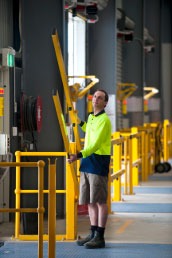
Our new multi offsite reserves have been outfitted with loading dock boom gates to improve safety.
2010/2011 Priorities/Outcomes
| 2010 Priorities | Outcomes | Status | 2011 Priorities |
|---|---|---|---|
| Continue to promote the safety of our team members, with a focus on manual handling | By continuing our education of manual handling risks and modifying our equipment we have reduced our LTIFR by 13 per cent from 9.2 to 7.97. |
|
|
| Identify the key energy efficiency opportunities in our business | Target has completed Energy Efficiency Opportunities Representative Assessments and developed strategy plans for the implementation of energy efficiency initiatives across the business. | ||
| Develop Target Environmental Packaging guidelines for our suppliers | We have developed draft environmental packaging guidelines with the aim to further reduce packaging waste. | ||
| Continue to support our community partners and encourage employee involvement with the community | Under our strategy of ‘safe, happy families’ Target contributed to and helped raise over $3.08 million to support our community partners. |
KEY
![]() Achieved
Achieved
![]() Partially achieved
Partially achieved
![]() Not achieved
Not achieved
Performance charts
People
At Target we continued our focus on manual handling practices and successfully reduced our LTIFR from 9.2 in the previous year to 7.97.
Under our new Diversity Strategy we commenced a pilot program for Indigenous School Based Traineeships in NSW, and store managers and the Senior Leadership Team attended cultural awareness training. We also increased the representation of women in non-traditional and senior management roles throughout the organisation. As at 30 June 2010, the percentage of women in management roles was 41.3 per cent.
During the year we introduced a new Paid Parental Leave scheme which provides 12 weeks paid leave (at half pay) to eligible permanent full-time or part-time team members.
We commenced a new Store Leadership Program, continued to roll-out our Future Leader Program for store team members and redeveloped 12 on-line training courses.
In August 2009 we held our inaugural Target Rondel Awards dinner to celebrate and recognise excellent individual and team achievements.
Environment
Although we are a small water user, this year for the first time we used new methodology to estimate our water consumption. Based on the assessment it was estimated to be 88 litres per FTE per day and a total of 339 megalitres per year excluding water usage associated with air conditioning. We plan to conduct water audits in the coming year to more accurately measure our water use.
In October we launched our Think Climate product label to customers, encouraging them to reduce their energy use by cold washing and line drying Target products. The new label can now be found on the care instructions on a large range of Target clothing and manchester across all our stores.
Following the removal of 100 million plastic shopping bags from our business annually in June 2009, we continued to educate our customers about the changes through in-store signage, print advertisements, our internet site and internal bulletins. Customers can now choose to bring their own bag or purchase one from our range of reusable or compostable bags.
This year we introduced commingled recycling in 28 selected stores in Vic, including a roll-out in our national office in Geelong. In addition, we implemented white paper recycling in 54 stores in Vic, SA and WA.
During the first week of June 2010, Target team members participated in our second annual Green Week to celebrate the first anniversary of Target’s national bag strategy and World Environment Day. This year our teams took part in the Target Green Week Challenge creating awareness and looking at ways we can further reduce our impact on the environment.
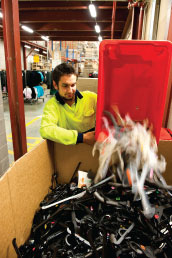
Our store teams have a strong focus on reducing waste by recycling cardboard, plastic and garment hangers.
Carbon and energy
Greenhouse emissions
Our total greenhouse gas emissions were estimated to be 239,827 tonnes of CO2e, up 9.1 per cent on last year, and this equates to 62.70 tonnes of carbon dioxide per million dollars of revenue, up eight per cent on last year. Our greenhouse gas emissions were largely due to electricity consumption at our stores, distribution centres and support centres (approximately 90.2 per cent), synthetic gases used in our air-conditioning (approximately 4.4 per cent) and waste disposed off-site (approximately 3.4 per cent).
Energy use
Our main energy use during the year was electricity consumption for lighting in our stores. Total energy consumption was 840,788 gigajoules, up 2.8 per cent on last year. Our total energy consumption per million dollars of revenue was estimated to be 220 gigajoules, up 1.8 per cent on last year. This energy use was mainly 88 per cent electricity and seven per cent fuel.
Energy efficiency initiatives
In 2009/10 we appointed EnTech USB to collect and analyse our gas, electricity and LPG consumption data and enable us to improve reporting on our energy use.
Based on the outcomes of our EEO Representative Assessments at 19 sites we established a strategy plan for implementation across all sites. In addition, Target drafted energy efficient standards for all sites and stores.
In the coming year Target aims to reduce energy consumption in all new sites through the selection of more efficient plant and equipment, enhanced operational control systems and improved maintenance regimes.
At our Qld state office we achieved a reduction in energy by upgrading to efficient light fittings. In addition solar panels were installed to further reduce our greenhouse emissions from energy use at this site.
Governance
Ethical sourcing
We require our suppliers to adhere to our Ethical Sourcing Code which ensures the goods we sell are made in safe working conditions and that basic human rights are respected. Our suppliers’ factories are audited regularly to measure adherence to the Code.
In 2009/10 Coles Group Asia, on Target’s behalf, conducted 14 factory audits, 55 factory audits were conducted by third party auditors and we acknowledged 174 factories through our mutual recognition program. During this year five zero-tolerance issues were detected and seven factories in China were deregistered as suppliers due to poor social compliance performance. As at 30 June 2010 there were 460 factories supplying Target through our Coles Group Asia team which are engaged in our Ethical Sourcing Program.
Our focus in this area is on improved communication with suppliers in this area, more regular detailed reporting to management and improved data base management.
Compliance
During the year the Target Fair Trading Policy was reviewed and revised to provide more concise direction.
We are not aware of any potential non-compliance during the year with environmental or health and safety legislation.
In accordance with the Australian Standard ASISO10002-2006 for Complaints Handling, Target provides a responsive and efficient complaints handling process, providing a fair and accessible service for our customers and stores. Our Customer Relations team received over 56,000 customer contacts last financial year, which were all recorded and responded to.
Community
Target’s community investment focused on our strategy of ‘safe, happy families’ with our total direct contribution exceeding $1.44 million. In addition to this our customers, suppliers and team members contributed $1.64 million resulting in a total community contribution in excess of $3.08 million to various partners including the Bonnie Babes Foundation, SIDS & Kids and UnitingCare Australia.
The funds raised from the sale of our Target reusable red bags over the past 12 months enabled us to donate $669,496 to The Alannah and Madeline Foundation’s Buddy Bag Program.
Over the past 12 months Target hosted 91 St John Ambulance first aid courses in stores across Australia. The four hour course specifically aimed at parents and carers of children 12 years and under is valued at $125 per person. Through the partnership 1,161 parents and carers received valuable first aid training free of charge.
Economic investment
With more than 1.3 million customer transactions in our stores every week, Target makes a significant economic contribution to the rural and metropolitan areas with over 24,000 team members.
Our total revenue for the year was $3.8 billion. At year end there were three new Target stores, four new Target Country stores and three stores were closed. To strategically engage our property partners we hosted a property forum with our developers and landlords in May 2010.
Our capital investment for the year including stores and systems was $88.3 million.
We launched our inaugural 2010 Supplier of the Year Awards which will formally recognise the outstanding contribution of our suppliers to Target’s ongoing success.
Strong partnerships with our suppliers are critical to our business. During the year we conducted a range of supplier forums and briefings to improve communications with our suppliers.

